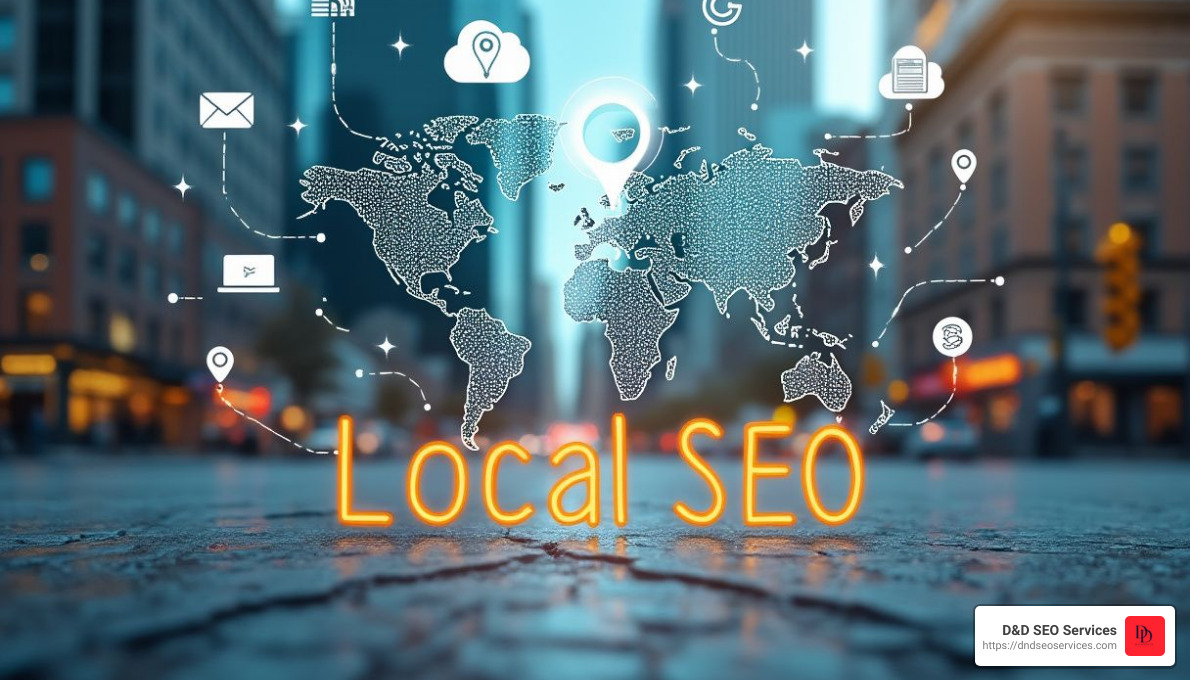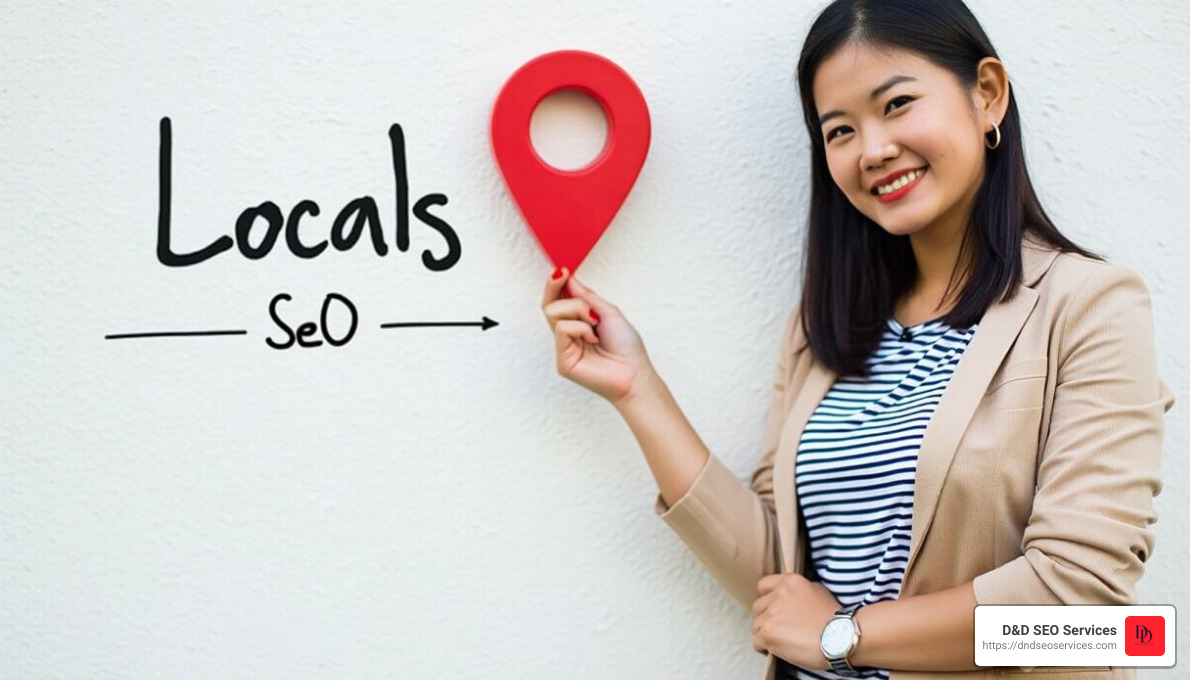Why Local SEO for Attorneys is Crucial
If you’re wondering why Local SEO for attorneys is important, here’s a quick answer:
1. More visibility to potential clients
2. Boosts online credibility
3. Helps you stand out from local competitors
4. Increases lead generation and conversions
5. Improves community trust
Now, let’s dive a little deeper.
Potential clients use the internet more than ever to find legal services. Whether it’s for a pressing legal matter or routine consultation, being visible online means the difference between a thriving practice and missed opportunities. Local SEO for attorneys ensures that when someone searches for “lawyers near me” or “family lawyer in [city],” your firm pops up at the top.
This targeted approach not only brings more visitors to your website but also translates into higher leads and client conversions. Effective local SEO establishes your credibility and helps you to stand out in a competitive market. It’s not just about getting more traffic; it’s about getting the right traffic.
I’m Danielle Birriel. With over a decade of experience in Local SEO for attorneys, I’ve dedicated my career to helping law firms improve their online presence and attract local clients. My team and I at D&D SEO Services specialize in creating personalized SEO strategies that drive real results.
Next, we’ll explore how to optimize your Google Business Profile to skyrocket your local SEO.
Step 1: Optimize Your Google Business Profile (GBP)
Complete Your GBP
First things first—complete every section of your Google Business Profile (GBP). According to Google, businesses with complete profiles are 70% more likely to attract visits.
Here’s what you need to do:
- Business Name: Ensure your business name is accurate and consistent with your branding.
- Address: Make sure your address is correct and matches your website and other listings.
- Phone Number: Use a local phone number to build trust with local clients.
- Categories: Select the most specific primary category that fits your practice. For example, if you’re a personal injury attorney, choose that as your primary category. Add secondary categories like “Law Firm” or “Legal Services.”
- Hours: Keep your business hours up-to-date to avoid frustrating potential clients.
Verify Your Profile
Verification is crucial for credibility. Google sends a postcard to your business address to confirm its legitimacy. Once verified, your profile gains more visibility and trust.
Benefits of Verification:
- Increased Visibility: Verified businesses are more likely to appear in Google Maps and local search results.
- Trust: A verified profile signals to potential clients that your business is legitimate.
- Access to Insights: Get data on how people interact with your profile, including views, clicks, and calls.
Add High-Quality Photos
Photos are essential for engagement. According to Google, businesses with photos get 42% more requests for directions and 35% more clicks through to their websites.
Tips for Adding Photos:
- Team Photos: Show who’s behind the firm.
- Office Photos: Give clients a feel of your working environment.
- Action Shots: Include images of you or your team in action, such as in court or during consultations.
Pro Tip: Hire a Google Certified Photographer to create a 360-degree virtual tour of your office. This makes your profile stand out.
Manage and Respond to Reviews
Reviews are vital for building trust. Encourage satisfied clients to leave positive reviews and engage with them. Responding to reviews shows that you value client feedback.
Handling Reviews:
- Positive Reviews: Thank clients for their feedback.
- Negative Reviews: Address concerns politely and offer solutions. This shows you care about client satisfaction.
Pro Tip: Avoid asking for reviews on multiple locations from the same client. This can trigger a manual review from Google.
By optimizing your Google Business Profile, you set the foundation for strong local SEO. Next, we’ll dive into leveraging local keywords and content to further boost your online visibility.
Step 2: Leverage Local Keywords and Content
To skyrocket your local SEO for attorneys, you need to focus on local keywords and content. This step is crucial for making your law firm visible to potential clients in your area.
Identify and Target Specific Keywords
Start with keyword research. Use tools like Google Keyword Planner or Ahrefs to find relevant local keywords. These tools help you identify what terms your potential clients are using to find legal services in your area.
Primary keywords should be specific to your practice areas and location. For example, “divorce lawyer in Miami” or “personal injury attorney Los Angeles.” Secondary keywords can be more niche but still relevant, like “child custody lawyer Miami” or “slip and fall attorney LA.”
Pro Tip: Aim for keywords with a keyword difficulty (KD) of 30 or below. This allows you to rank higher without spending a fortune on link-building.
Create Localized Content
Localized content helps you connect with your community and boosts your search engine rankings. Here’s how to do it:
- Blog Posts: Write about local industry trends, legal news, or case studies. For example, a blog post about “How Miami’s New Traffic Laws Affect Personal Injury Cases” can attract local clients.
- Landing Pages: Create specific landing pages for each practice area and location. If you handle multiple locations, ensure each has its own page, like “Criminal Defense in Oak Park” or “Family Law in Evanston.”
- Practice Area Pages: Include detailed information about your services in each practice area. Use local keywords to make these pages more relevant to your target audience.
Example: Hipskind & McAninch, LLC mentioned their primary business location (Belleville) in their website’s meta title, boosting their local SEO.
Optimize On-Page Elements
On-page SEO elements are essential for making your content easily findable. Here are the key areas to focus on:
- Title Tags: Include your primary keyword and location in the title tag. For example, “Miami Personal Injury Lawyer – John Doe Law Firm.”
- Meta Descriptions: Write compelling meta descriptions that include your primary keyword and a call to action. Keep it within 155-160 characters.
- Headers (H1, H2, etc.): Use headers to structure your content. Include keywords in your H1 and H2 tags to improve readability and SEO.
- Internal Linking: Link to other relevant pages on your site. This helps search engines understand your site’s structure and improves user navigation.
Pro Tip: Ensure your pages load quickly. A speed score of 90 or higher on Google PageSpeed Insights is ideal.
By leveraging local keywords and creating localized content, you can significantly boost your law firm’s online visibility. Next, we’ll discuss building citations and local listings to further improve your local SEO efforts.
Step 3: Build Citations and Local Listings
Building citations and local listings is crucial for Local SEO for attorneys. Citations are online mentions of your law firm’s name, address, and phone number (NAP). They help improve visibility and improve local search rankings.
Submit to Major Directories
Start by submitting your law firm to major directories. These directories are trusted by search engines and can boost your credibility.
- Yelp: Yelp is a popular review site that can drive significant traffic to your law firm. Ensure your profile is complete with accurate NAP information, photos, and client reviews.
- Yellow Pages: Though traditional, Yellow Pages still hold value in online directories. Make sure your listing is accurate and up-to-date.
- Better Business Bureau (BBB): BBB is referenced in Google’s content quality guidelines, which means Google views it as a trusted authority. A BBB listing can improve your firm’s credibility.
- Legal-Specific Directories: These directories include Findlaw, Justia, Avvo, Nolo, and Lawyers.com. They are specifically designed for law firms and can significantly improve your local SEO.
Ensure NAP Consistency
Consistency in your NAP information across all platforms is vital. Inconsistent information can confuse search engines and potential clients, leading to lower search rankings.
- Consistent Information: Ensure that your business name, address, and phone number are the same on every directory and online listing. This consistency helps build trust with search engines.
- Data Aggregators: Use data aggregators like Moz Local and BrightLocal to distribute your NAP information across multiple directories. This can save time and ensure accuracy.
Moz Local works by submitting your business information to various data aggregators, including Acxiom, Infogroup, and Neustar/Localeze. It also handles your Bing listing and some local directories.
BrightLocal provides a comprehensive toolset for managing your local SEO, including a citation tracker and local search rank checker. It’s cost-effective and ideal for small to mid-sized law firms.
Pro Tip: Regularly audit your citations to ensure ongoing NAP consistency. Use tools like Moz Local and BrightLocal to monitor and update your listings as needed.
By submitting to major directories and ensuring NAP consistency, you can build a strong foundation for your local SEO. Next, we’ll discuss acquiring and managing reviews to further improve your online presence.
Step 4: Acquire and Manage Reviews
Encourage Clients to Leave Reviews
Reviews are crucial for local SEO for attorneys. Positive reviews can boost your rankings and attract more clients. Here’s how to encourage your clients to leave reviews:
- Ask for Reviews: Don’t be shy. After a successful case, ask your clients to leave a review. You can do this in person, via email, or on receipts.
- Make It Easy: Provide direct links to your Google Business Profile or other review platforms. The easier you make it, the more likely they’ll follow through.
- Follow-Up: Send a follow-up email a few days after your initial request. A gentle reminder can go a long way.
- Offer Incentives: Consider offering a small discount or entry into a giveaway for those who leave a review. Just ensure this complies with platform guidelines.
- Highlight Reviews: Showcase positive reviews on your website and social media. This not only builds trust but also encourages others to leave their feedback.
Respond to Reviews
Responding to reviews shows that you care about client feedback. This can improve your business reputation and client loyalty. Here’s how to do it effectively:
- Respond Quickly: A quick response shows that you value their feedback. Aim to reply within 24-48 hours.
- Be Professional: Always maintain a professional tone, especially with negative reviews. Address their concerns without getting defensive.
- Acknowledge Issues: If a client had a bad experience, acknowledge their concerns and offer a solution. This shows you are committed to improving.
- Thank Them: Whether the review is positive, negative, or neutral, thank the client for their feedback. It shows you appreciate their time.
- Use Reviews as Content: Think of reviews as additional content. Responding to reviews adds more keywords and relevant content to your profile, which can help with local SEO.
Example:
Client Review: “The service at the downtown location was slow.”
Your Response: “We apologize for the slow service at our downtown location. We’re addressing this issue to improve. Thank you for your feedback!”
By actively managing and responding to reviews, you can build a strong online reputation and improve your local SEO. Next, we’ll discuss engaging with the local community to further boost your visibility.
Step 5: Engage with the Local Community
Participate in Local Events
Getting active in your local community is a game-changer for local SEO. When you participate in or sponsor local events, you build relationships and gain visibility. This can lead to valuable backlinks and community goodwill.
Example: A personal injury law firm might co-sponsor a charity run with a local physical therapy clinic. This not only helps the community but also connects your firm with potential clients and local businesses.
Pro Tip: Look for events that align with your practice area. If you’re a family lawyer, consider sponsoring local school events or family festivals.
Build Local Backlinks
Local backlinks are links from local websites that point to your site. These are crucial for improving your local SEO. You can earn these links by partnering with local businesses or participating in community activities.
Strategies to Build Local Backlinks:
- Guest Posts: Write articles for local blogs or news sites. Focus on topics that are relevant to your community and practice area.
- Testimonials: Offer testimonials for local businesses you’ve worked with. They might link back to your site in return.
- Local Directories: Ensure your law firm is listed in local business directories like Yelp and Yellow Pages.
Example: A law firm in New York City might write a guest post for a popular local blog about new city regulations. This not only provides valuable information but also earns a backlink.
Pro Tip: Use tools like Moz Local to find local directories and ensure your NAP (Name, Address, Phone Number) is consistent across all listings.
Engage in Community Service
Volunteering and community service can also boost your local SEO. When local media cover your efforts, you gain valuable backlinks and positive exposure.
Example: A law firm volunteering at a local food bank might get featured in a local newspaper. This not only helps the community but also provides a high-quality backlink.
Pro Tip: Share your community service activities on social media. This increases your visibility and encourages local media to cover your efforts.
Network with Local Businesses
Building partnerships with local businesses can lead to mutual benefits, including backlinks and referrals.
Example: A business lawyer might partner with a local accounting firm to host a seminar on tax laws. This collaboration can lead to backlinks from the accounting firm’s website and referrals.
Pro Tip: Reach out to local businesses you’ve worked with in the past. Offer to write a testimonial or collaborate on a project.
By engaging with your local community, you can build strong relationships, earn valuable backlinks, and boost your local SEO. Next, we’ll answer some frequently asked questions about local SEO for attorneys.
Frequently Asked Questions about Local SEO for Attorneys
How much does lawyer SEO cost?
The cost of SEO for lawyers can vary widely. Factors like the size of your firm, the competition in your area, and the specific services you need all play a role. On average, law firms might spend anywhere from $500 to $5,000 per month on SEO services.
- Small firms: Often spend less as they target a smaller geographic area.
- Large firms: May invest more to cover multiple locations and practice areas.
You get what you pay for. Cheap SEO services might cut corners and deliver poor results. Investing in quality SEO can yield better visibility and more clients over time.
Why is local SEO important for law firms?
Local SEO for attorneys is crucial. Why? Because most people search for legal services with local intent. For example, someone might search for “DUI lawyer in Chicago” rather than just “DUI lawyer.”
Here are some key reasons:
- Visibility: Local SEO helps your firm appear in local search results, including Google Maps and the local pack.
- Brand Awareness: Being visible locally builds your brand and makes you a trusted choice in your community.
- Legal Leads: More visibility means more potential clients finding and contacting your firm.
What is SEO for lawyers?
SEO for lawyers involves optimizing a law firm’s online presence to attract organic traffic from search engines like Google. This includes unpaid results, meaning you don’t pay for ads.
Key elements include:
- Organic Traffic: Driving visitors to your site through relevant search queries.
- Search Engines: Ensuring your website meets the criteria that search engines use to rank pages.
- Unpaid Results: Focusing on earning traffic without paying for ads, like through content optimization and link-building.
By understanding and implementing SEO, law firms can improve their online visibility, attract more clients, and ultimately grow their practice.
Conclusion
In summary, Local SEO for attorneys is essential for boosting your law firm’s online visibility and attracting more clients. By optimizing your Google Business Profile, leveraging local keywords, building citations, acquiring reviews, and engaging with your local community, you can significantly improve your search engine rankings and drive more traffic to your website.
At D&D SEO Services, we specialize in personalized strategies custom to your law firm’s unique needs. Our team of experts will work closely with you to develop a comprehensive local SEO plan that maximizes your online presence and generates high-quality leads.
We also leverage AI-driven solutions to analyze data, optimize your site, and stay ahead of the competition. Our advanced tools and techniques ensure that your law firm remains visible and relevant in local search results.
Ready to lift your local SEO strategy? Contact us today to get started on your journey to online success with D&D SEO Services. Together, we can open up the power of optimization techniques for your business growth.








